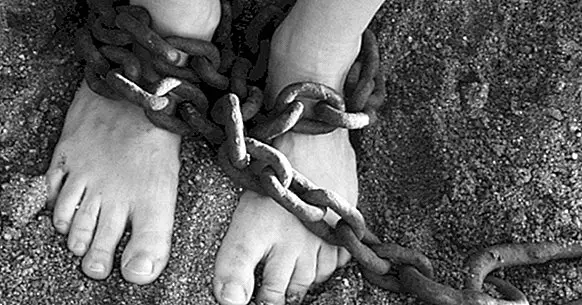Satisfied slave syndrome: when we appreciate the lashes
[...] The main problem of the slave are not in themselves the various calamities that he has to endure day after day because of his condition as a slave (...) but rather, it is the matrix of thought that does not allow him to question his slavery. [...]
Satisfied slave syndrome is not a term collected by the DSM nor by any other psychiatric diagnostic manual.
I refer with this new concept to the set of symptoms presented by some people who, despite living an objectively miserable life, seem to be not only resigned but grateful for their existence. In this article I will try to explain some assumptions in which this defense mechanism occurs, its causes and its social and cultural context.
Physical or mental chains?
In the yes of a given society, we could consider the following: What is the worst thing that can happen to a slave?
One could answer that, without a doubt, the worst of the life of a slave is, of course, the constant humiliation and degrading treatment implied by his condition as a slave. However, there would be another possible answer: the worst thing that can happen to a slave is to feel satisfied and even grateful for the life that he has had to live and the treatment it receives.
A society of adapted neurotics
This paradoxical satisfaction of the adapted neurotic does not reflect on the future and reduces the complexity of life to the immediate satisfaction of the daily routine. Although many contemplate this philosophy of life of the Carpe Diem as a laudable sample of adaptation and optimism, the truth is that it is one more form of self-deception . The cognitive trap is that the satisfied slave progressively increases his resigned acceptance of his slave condition ; a condition that, based on hic et nunc, ends up going unnoticed by the individual.
What defines a slave is not his physical ties and his freedom of movement without the express authorization of his master. He does not even define what lashes he receives.
Assuming the ideology of power
The problem of the slave satisfied with the blows and lashes is not the physical pain that they cause him, but the psychological predisposition to receive them and to naturalize the cruelty of the powerful over him.
Consequently, the misfortune of the slave is not so much the situational forms that suffer in his daily life in terms of physical abuse, but the assumption of the thought of the powerful , which prevents him from considering himself and therefore questioning his state of submission. This means that he accepts in an uncritical way the conditions of life with a resigned passivity and without a hint of determination to be able to reverse his life. If we also add a perception of satisfaction for the treatment that is offered to him as a slave, the individual is condemned to live a miserable life. In this case, the chains do not hold the body, but the mind .
The satisfied slave in today's society
It is true that, in today's societies, struggles for social and civil rights have cemented some laws that protect us from flagrant abuses such as chain slavery and whiplash. However, we still drag some vestiges of the slave system.
The current socio-economic and cultural system imposes certain values and exerts a continuous manipulation on the way we think , leading to the acceptance of some practices that completely collide with the basic right to think critically and autonomously.

The modern slavery it consists in that we attend without previous reflection to a series of familiar, labor and social routines. In this frantic day-to-day, we are nullified by the ability to take the initiative in the face of very important issues such as consumption (what we buy and why), the fashion (very related to the image of ourselves that we want to project to the world) and morality (those reflections that should guide our actions towards specific ends).
Between acriticism, passivity and Carpe Diem misunderstood, our mind stops considering certain things, which in the end means a passive resignation before the vicissitudes of life. In this way, as a slave would act and because of the learned helplessness that supposes the no confidence in our possibilities, we end up being mere spectators of a status quo that we believe is ubiquitous and, therefore, by itself legitimate .
Depressive and anesthetized young people
As he wrote Álvaro Saval In his article "Youth depressive or anesthetized youth?", the manipulation of our thoughts is shaping a fertile culture for power: binds us to prejudices, slogans and stereotypes that paralyze young people in a present devoid of hope .
Although the 15-M movement woke up a large part of these anesthetized young people under the yoke of the uniform thinking of technocracy and presenteeism, the other half continues to inhabit a scenario in which uniformity of thought, precarious jobs and leisure moments follow a identical pattern.
Without critical thinking there is no freedom
In these circles, any hint of independent thought or criticism of certain uses and customs is vilified and systematically excluded . Thus, the fear of thinking for oneself and self-censorship are the obstacles to escape the chains and lashes in modern slavery. Of course, the system takes advantage of this type of thinking, propping up highly obedient individuals: precarious but productive workers, consumers without criteria and, of course, nothing critical of society or the injustices they suffer even without realizing it.
Adolescence is not only the stage in which our personality is consolidated, but also It is the time of our thoughts are structured and trace certain master lines of our perception of the world around us . The influence of the group on the adolescent is always a relevant factor when presuming the influence on uniform thinking or, on the contrary, on critical thinking.
Without critical culture, individuals are unable to think about reality for themselves. In this sense, existence ceases to be a journey in search of good, truth and happiness , to become an unreason of illusions and stereotypes whose appearance is reviewed by the well-being that a taxed and assimilated thought offers us: all for not having the courage to overcome the chains of the slave in time.
Bibliographic references:
- Triglia, Adrián; Regader, Bertrand; García-Allen, Jonathan (2016). Psychologically speaking. Paidós.
- Ardila, R. (2004). Psychology in the Future. Madrid: Pyramid. 2002



















